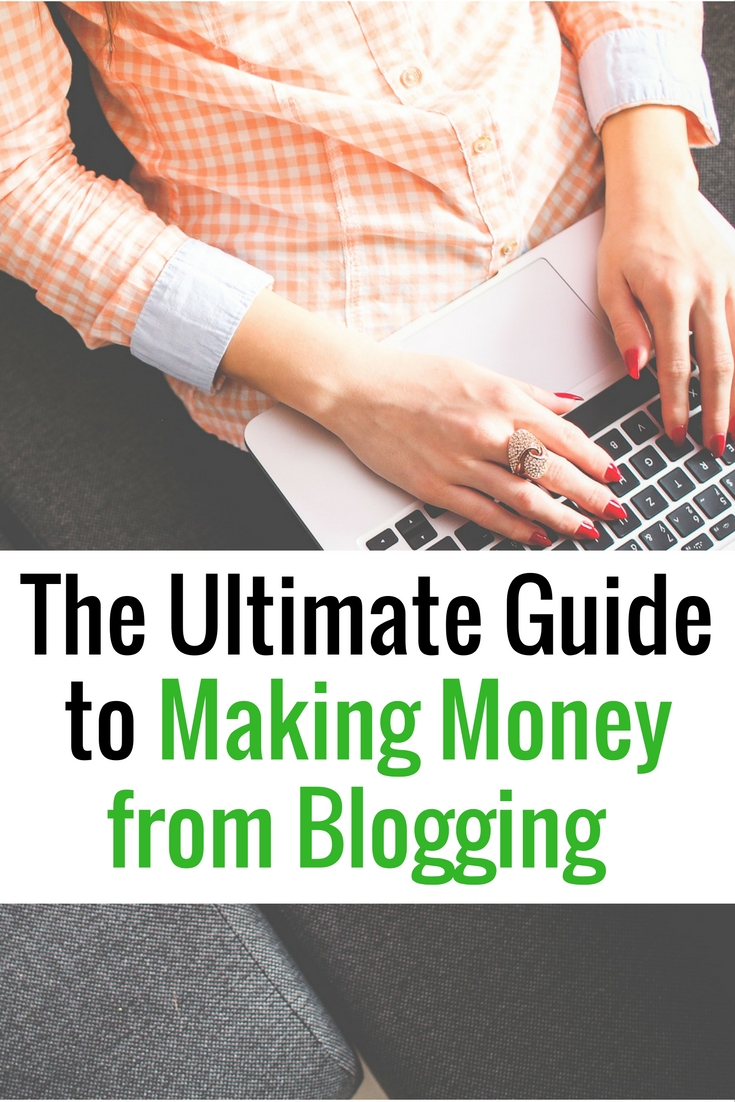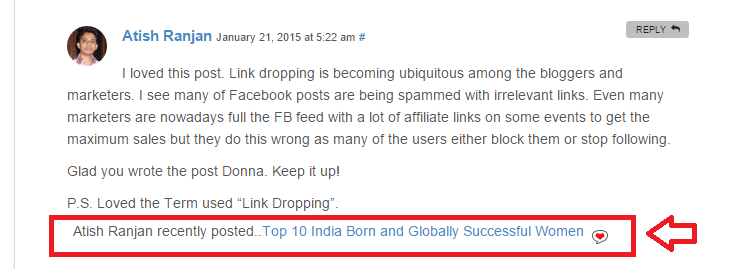
Have you ever read a blog and wondered how the writer could possibly make money doing this? A few years ago, I decided to find out and began a blog of my own. It turned out to be a profitable whim, as blogging is now my main job, one I can do anywhere. I've blogged waiting for my son to get out of school, while my kids play at the park, even drinking coffee in my pajamas. You can, too. I wrote an article before about how to start a blog the easy way, but realized that a longer post was in order. With that in mind, I present to you the Ultimate Guide to Making Money from Blogging.
Since this is quite a long read, here are anchor links to help you jump to sections that interest you. You can also choose to read this article chronologically.
- Getting Started: Customizing, Hosting, and More
- Content Creation: From Idea to Post
- Generating Hits: The How-to's of Blog Networking
- SEO: What Is It and How Can It Help Me?
- Opportunity Comes A-Calling: Getting Publicity
- The Cash Flow: Ads Are Your Friends
- Now You're a Business: Your Taxes and Self-Employment Registration
Getting Started: Customizing, Hosting, and More

Before you can make money as a blogger, you need a blog. First, you need to decide how you're going to host your job (we'll get to what this means in a moment) before you register your domain name and pick a host for your blog. Once you've done all this, you can customize your blog with themes. I know this all sounds a bit overwhelming and confusing, so let's break it down.
What Kind of Host Should I Pick?
There are two ways to set up a blog: free or self-hosted. Every blogger you speak to will have their own opinion as to which one is best. Let's discuss what these options mean:
- Free Blog: If you're strapped for cash going into this venture, a free blog program such as WordPress or Blogger may be right for you. Shout Me Loud (@shoutmeloud) compares these two major free blog sites here.
- Self-Hosted Blog: This is the option I went for when I started out. It's less of a hassle to change things later on if you need to and it looks much more professional. Although there is, of course, a cost to having your site hosted, it doesn't have to be a large one. BlogTyrant (@BlogTyrant) offers an in-depth look at the world of self-hosted blogging here.
Registering Your Domain Name
Now that you know what your hosting options are, you're almost ready to get started. Before we move on, you need to register your domain name. As TheSiteWizard.com (@thesitewizard) explains in this article, there are several good reasons to register your domain:
- If you decide to move hosts, your domain will go with you. Any followers to your site would not have to be informed of the move, as the address to your site remains the same.
- Getting your blog sponsored (which we will discuss more later) is easier with a registered domain, as sponsoring companies are more likely to take you seriously.
- Your domain name can make it easier for people to find you.
It's best to pick a domain name that is relevant to what you plan to use your blog for. For example, if you plan to focus on discussing your favorite hobby, “www.yourfavoritehobby.com” would be a good starting point. However, if you're not sure you'll stick to just one topic, like woodworking or baking, you may not want such a one-dimensional domain name. Many bloggers choose to use their names or a phrase or other less limiting domain name, instead. Be sure to have a few backups in mind, as the name you want may not be available. Once you've done that, you will need to make your payment to your host site (assuming your host site is not a free one, as discussed above). You can do this with most major credit cards or PayPal.
You're probably wondering where you can go to register your domain, now that you know how to. LifeHacker (@lifehacker) offers a list of some of the best domain registrars available, including:
Hosting Your Site
You know what hosting means now, and the difference between free hosting and self-hosting. You have thought up a domain name and registered it. Now, it's time to host your site. Since we've already listed the major free hosting sites, we'll just list a few of the best self-hosting sites according to The Next Web (@thenextweb) here:
- Squarespace
- Postagon
- Silvrback
- Jekyll
Don't be afraid to compare several hosting sites; this will be your blog's home and you need to make sure you can do all the things you want to do with it through the host you pick. Once you've settled on a host site, complete the signup according to the steps on the site, and then you can begin to customize your blog.
Customizing Your Blog
You want your blog to stick out, to be engaging, and to look nice. How you customize your blog will go a long way towards helping with those goals. You don't need experience in web designing to do this, either: your chosen host site will usually offer themes, many of them free, for you to use with your site. For Dummies (@ForDummies) has a breakdown of what to focus on and how to make it work for you here.
Click here to go back to the top.
Content Creation: From Idea to Post

The good news is, your blog is now set up. The bad news is, that was the easy part. You now have an appropriately named site of your very own, customized to suit your needs…and nothing to put in it. Shoot. You need content, but where do you get the content from? The good news is you don't need to be a genius or even a very good writer to come up with blogging ideas. You just need to be excited about what you're writing.
Getting Ideas
Some of the best ideas for a blog post come from your own life, to be honest. For me, my best ideas usually come while dealing with everyday chores. My brain is busy churning out titles while my hands are on autopilot folding laundry. If you're still stumped for topics, perhaps some of these brainstorming ideas from Groove HQ (@GrooveHQ) will help you:
- Read a lot and read often — books, newspapers, other blogs, whatever you can find to grab your interest. Your next blog post might be one turn of the page or a click of the mouse away.
- Reach out to your readers — there may be something they'd like to read about.
- Share your experiences — Some of my best posts have come from things happening in my own life.
Going From the Drawing Board to the Audience
Once you've brainstormed an idea for your post, you need to actually make the post. For some, this can seem like a daunting task. How do you get it from the rough outline in your head (or plastered all over the wall behind your desk on PostIt notes, if you're like me) to your audience? If you follow these simple steps from WordStream (@WordStream), you'll find the process is much easier than you think:
- Choose a topic that interests you.
- Create an outline of some kind — whether it's a traditional outline or random scribbling that only makes sense to you. Just organize your initial thoughts for your post.
- Research your topic. This is a throwback to your high school teachers and the essays they used to assign — research is very important for an accurate, engaging post.
- Come up with your title. Now would also be a good time to decide on subtitles, if any.
After you've come up with a topic, done your outline and research, and settled on a title and any applicable subtitles, you can begin writing. I usually just let the words flow and go back to edit it once I feel the post is complete.
Using Images and Other Media
We've come up with our blog post, done an outline, written our draft, and we're almost ready to post. We're just missing one thing: relevant media. This was a tricky one for me when I just started out, as using media in your posts can be a minefield of problems if you don't do it correctly. Amy Lynn Andrews (@AmyLynnAndrews) offers a list of tips and tricks for using media in your blog correctly and, most importantly, legally. Some of her tips include:
- Be sure to use your images legally. Just because a picture is on the Internet does not mean you have the right to use it as your own.
- Look for stock photos and other legal to use images on sites such as Pixabay.
- Credit the image properly.
It's also important to make sure the images you use are relevant to your post. A picture of a cat with a cheeseburger probably doesn't belong in a post about how to plan a trip to Italy.
Click here to go back to the top.
Generating Hits: The How-to's of Blog Networking

We've learned how to host our site, set our blog up, and written our first post, complete with images. We are in business. Sort of. Your audience won't just flock to you; you need to get your blog out there to potential readers. One of the best ways to do that is through networking. You can network your blog in a variety of ways, from utilizing social media to leaving comments on other blogs.
Utilizing Social Media
At this point, almost all of us have some sort of social media account. It shouldn't surprise you, then, that creating an account for you to use as the face of your blog can help generate traffic and help you gain an audience. Jeff Goins of GoinsWriter (@GoinsWriter) offers an in-depth look at how to get social media to work for your blog here.
Networking on Other Blogs
Many blogs and websites offer the option, when you leave a comment on a post, to do so using a combination of your own name and your website. WordPress (@WordPress) expands on how this type of interaction can help your blog gain traffic.

SEO: What Is It and How Can It Help Me?

When I first started out as a writer, I had never heard the term “SEO” before and was thoroughly lost and confused. I knew what a CEO was, and I am somewhat embarrassed to admit I thought SEO might mean something similar. Finally, when I got into freelancing and kept finding the term “SEO compliant,” I knew I had to figure out what that was. Once I did, I began to see why it was so important. We'll break this section down into two parts: what is SEO, and how can SEO help me?
What Is SEO?
Contrary to what I originally guessed, SEO is nothing like Chief Executive Officer. It has nothing to do with business, strictly speaking. Red Evolution (@RedEvo) explains:
- SEO stands for Search Engine Optimization
- Because Google uses certain words and terms to determine its search engine results, using SEO can bring your blog to the top of a person's search.
How Can SEO Help Me?
As mentioned above, SEO usage can help bring your blog to the top of a Google search. OpenVine (@OpenVineWeb) offers a list of how to use SEO to your advantage:
- Research your topic to find keywords.
- Use your keywords throughout your post in things like titles, subtitles, your introduction sentence, and your concluding paragraph.
- Link back to other relevant blogs and articles.
Click here to go back to the top.
Opportunity Comes A-Calling: Getting Publicity

Using your networking skills and SEO, you should now have built up a following for your blog. You can now focus on using your newfound skills as a blogger to make money. This means you should now begin to think of your blog as a business, which means you need to find some opportunities to put your work out there. We've already gone over social media and blogger networking, so here we will discuss publicity opportunities and how to get them.
Getting Publicity For Your Blog
When looking at bloggers to work with, companies look for specific things. Problogger (@problogger) explains what these specific things are here, such as:
- An engaged, relevant audience — a company looking to sell baby items to parents isn't likely to be interested in a blogger whose main audience is made up of people interested in learning how to knit.
- Similar brands mentioned elsewhere on your blog. Even if you aren't being paid to do so, if you find a product relevant to your blogging platform, write about it for this reason.
- Honesty — if you have written about other similar brands in the past, paid or otherwise, other companies looking at you as a potential blogger to work with want to know that your reviews are honest and true to your experience.
The Cash Flow: Ads Are Your Friends

I'm sure you've seen them on some of your favorite blogs and wondered why they're there, and if you should look into using them yourself: ads. Allowing brands to advertise on your blog is a go-to source of income for many bloggers, myself included. Jeff Bullas (@jeffbullas) offers explanations on how to make ads work for your blog, including
- Pay Per Click ads. The advertiser will pay you each time someone clicks on their ad.
- Pop Ups. Although a lot of people dislike them, they are a viable source of income for a blogger.
- Sell text links. This means, essentially, that someone else will pay you to hyperlink their ads into your post.
Other Cash Flow Options
Perhaps ads aren't your thing. They're not for everyone, so it's a good thing there are other options out there to help you make money from your blog. All Indie Writers (@allindiewriters) points an alternative niche in affiliate marketing, such as
John Meese (@JohnRMeese) offers further advice on optimizing your revenue streams with digital products such as eBooks, apps or other digital products here, all of which you can easily advertise on your blog.
Click here to go back to the top.
Now You're a Business: Your Taxes and Self-Employment Registration

You are now, officially, in business. No, really — you are a business and need to follow certain legal guidelines. This came as quite a shock to me when I first started out. Up until that point, I had worked traditional jobs where most of this was taken care of by my employer and my taxes were fairly straightforward. This can be confusing, so we'll break it down again.
Self-Employment Registration
When you work a traditional job, you fill out forms for your employer that allow them to put on the payroll and claim you as a legal employee. When it comes to freelancing, which is what the government will likely consider your blogging business venture, you need to fill out paperwork to claim your income and make your business legal. To get the ball rolling, you need to register as self-employed. This is actually a very straight-forward process. The Small Business Administration (@SBAgov) has an easy-to-follow guide on registering yourself as a self-employed freelancer here for US bloggers.
Your Taxes
Now that you are self-employed, your taxes won't be coming out of your paychecks anymore, so you'll need to fill out your paperwork and tax information a little differently. Forbes (@Forbes) offers advice on how to do so here, including:
- Work with an accountant. This will help ensure you don't miss anything and end up owing more taxes.
- Develop a basic understanding of what taxes you need to pay and keep track.
- Pay your estimated taxes quarterly. Your accountant can help with this.
- Make sure your accountant understands how your business works.
- Find out which expenses you can write off. Last year, I bought a new tablet strictly for work purposes and was able to write it off completely.
I hope this guide helps you on your blogging journey. I have so enjoyed this opportunity to work from home and be here for my kids when they need me. One last word of wisdom before we close: remember that Rome wasn't built in a day — your blog will require time to build up a following and begin making money, so don't be discouraged. Let us know what you think in the comments, and don't forget to share.




What about taxation for Indian bloggers?